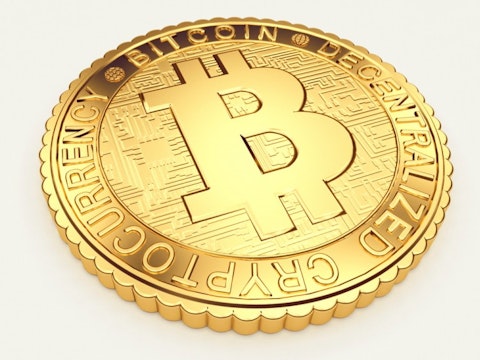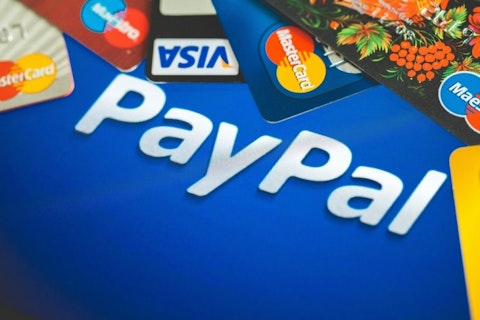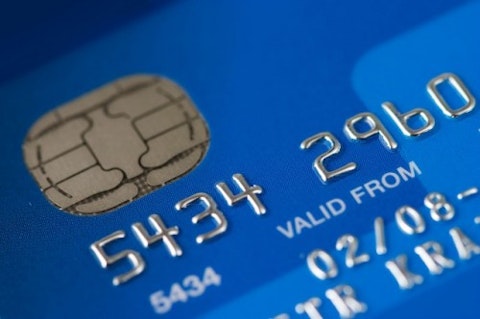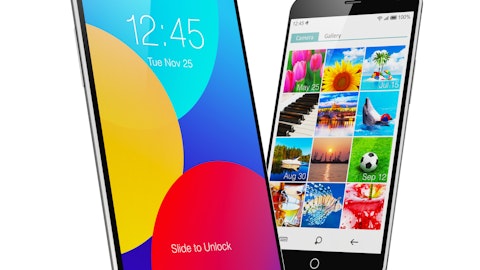Bitcoin remains mysterious, even after more than six years as an open source online currency. Its value peaked in 2013 — when it also inspired the memeplex that is Dogecoin — and its creator was unveiled as much as an anonymous person or group can be unveiled. Users mine bitcoin by allowing their computers to run complex algorithms and software, in a way being paid rent for use of their CPU resources. There are a bunch of companies that accept bitcoin payments. The idea has inspired countless episodes of America’s favorite “eccentric geniuses commit or solve really weird crimes” television and even more mainstream shows like the Good Wife. One part of bitcoin’s appeal is that it can be anonymous. But another large part is that it’s instantaneous and free to exchange bitcoin funds, and there are at least 10 bitcoin alternatives to send money without large fees.

vonDUCK/Shutterstock.com
Amazon.com, Inc. (NASDAQ:AMZN) briefly flirted with the peer-to-peer payment market before shutting down its Amazon WebPay service in 2014 and may be exploring an alternative to catch up with the competition, such as PayPal, which has been one of the oldest players not just in the peer-to-peer transactions but business-to-consumer as well. Meanwhile, Amazon.com, Inc. (NASDAQ:AMZN) is challenging Paypal Holdings Inc (NASDAQ:PYPL) and Square Inc (NYSE:SQ) by expanding its Pay With Amazon function to third-party mobile apps.
Earlier this year, PayPal Holdings Inc (NASDAQ:PYPL) became an independent, publicly-traded company following the spin-off from eBay, and has recently acquired Xoom, another digital money transfer company that has increased PayPal Holdings Inc (NASDAQ:PYPL)’s exposure with the addition of around 1.30 million customers from more than 30 countries.
Apple Inc. (NASDAQ:AAPL)‘s Apple Pay wants to be yours and everyone’s first choice in secure payments, but, so far, it has not entered the person-to-person transfer market. As recently as mid November, the Wall Street Journal reported that Apple Inc. (NASDAQ:AAPL) is in talks to build its own Venmo-like money transfer service. In the meantime, some third-party apps use Apple Pay’s robust and secure framework to offer payment services. Whatever the future of the transfer market, Apple Inc. (NASDAQ:AAPL) has the resources and the capabilities to become one of the leaders in the peer-to-peer transactions.
It’s not surprising that these companies are focusing on business-to-consumer segment first, since with the growth of eCommerce, the mobile payments are expected to grow to $1.0 trillion in 2017, compared to around $500 billion this year, according to an IDC report. Nevertheless, the growth of the popularity of digital transactions should also boost the volume for peer-to-peer transfers and the current players in the mobile and digital payments are the most likely to benefit from it.
10. Venmo
Privately held Venmo is the current darling of peer-to-peer payments. Users with linked bank accounts and many debit card users can send money for free, while credit card users and some debit card users pay a 3% fee. All users receive money for free. Venmo has a limit of $300 per week for users who haven’t independently confirmed their identities and just under $3,000 per week for those who have verified identities. Funds change hands immediately and can be transferred from Venmo to a bank account in about one business day.

9. BitGold
Canadian startup BitGold taps into the “gold revival” touched off by the worldwide recession of the last decade. Users exchange money for gold bullion in order to exchange it for goods and services or with each other. Services offered include a prepaid MasterCard that debits gold instead of dollars. Sending gold from one user to another is technically free, but each BitGold user — both sender and recipient — has paid a 1% fee for initially converting dollars into gold bullion, for a total implicit fee of 2%.

8. Google Wallet
Like Venmo, Alphabet Inc (NASDAQ:GOOGL)’s Google Wallet is free for those with linked bank accounts or using debit cards. Money is sent from users’ “Wallet” balances or debit cards almost instantly, with even rare outliers completed in three business days at most. Sending from a bank account takes longer — between 3 and 10 business days. After a short beginner period, users can send any amount under $10,000 at a time and a total of $50,000 in a five-day period. Transferring to a bank account has similar limits, with smaller limits when you transfer to a debit card.

GongTo/Shutterstock.com
7. PayPal
PayPal Holdings Inc (NASDAQ:PYPL)’s platform is one of the oldest and most entrenched online payment systems, offering both a major secure online payment service for vendors and an established and reliable peer-to-peer payment system. Vendors (and users who issue invoices) pay credit-card-like fees to accept PayPal, but personal users with linked bank accounts or PayPal balances can send and receive payments for free.

www.BillionPhotos.com / Shutterstock.com
6. The Western Union Company (NYSE:WU)
The absolute classic American money transfer service still offers some great values, especially for the millions of Americans who rely on Currency Exchanges and other paycheck-cashing services. But the real steal at The Western Union Company (NYSE:WU) is sending money online. Users who send money directly to a bank account can send up to $5,000 for a flat fee of $5. The Western Union Company (NYSE:WU) proves you don’t have to be described as new, lean, or a startup to be an alternative to bitcoin to send money without a large fee.

5. Square Cash
Square Inc (NYSE:SQ) revolutionized the mobile credit-card-swipe market and inspired a flood of competitors with their own plug-in card reader modules. Square Cash offers personal users a way to send money — up to $250 a day for unverified identities and $2,500 for verified users — in a setup very similar to Venmo’s but linked only to a debit card. Square Inc (NYSE:SQ) offers an unusual feature in its “cashtags,” which let users choose an anonymous username they can share when requesting payment.

4. Facebook (NASDAQ:FB)
Facebook Payments was only launched a few months ago, letting users send money for free using debit cards. The service seems designed to help Facebook users spend even more money on Farmville, and pursuant to that, most of the fine print is about developers, subscriptions, and Sponsored Posts.

3. Skrill
Skrill is a British company founded in 2001, making it ancient in internet-payment years. Users can send payments within the U.S. for a 1% fee that’s capped at $10, with competitive rates for international transfers to hundred of countries. The money is transferred instantly and available for withdrawal to bank accounts.

claffra/Shutterstock.com
2. Moneygram International Inc (NASDAQ:MGI)
Like Western Union, Moneygram International Inc (NASDAQ:MGI) is an American institution for those who regularly wire money, usually internationally. But users who send money online from a bank account can send up to just under $3,000 for a fee of about 2%, and the recipient can pick the cash up from any Moneygram International Inc (NASDAQ:MGI) location, which includes any Wal-Mart store, in under an hour.

1. TransferWise
TransferWise offers an unusual benefit compared to the others on this list: its founders, burned by rough international transfer fees while working on global chat behemoth Skype, insisted on finding a cheaper and more transparent way to send money internationally. Sending money from the U.S. to any of TransferWise’s supported countries has a maximum fee of just under 1%, and TransferWise relies on the “mid-market rate” for exchange that it swears is the most fair. With their focus on reducing costs in the global economy, TransferWise is unique among these 10 bitcoin alternatives to send money without large fees.

Ashwin/Shutterstock.com





